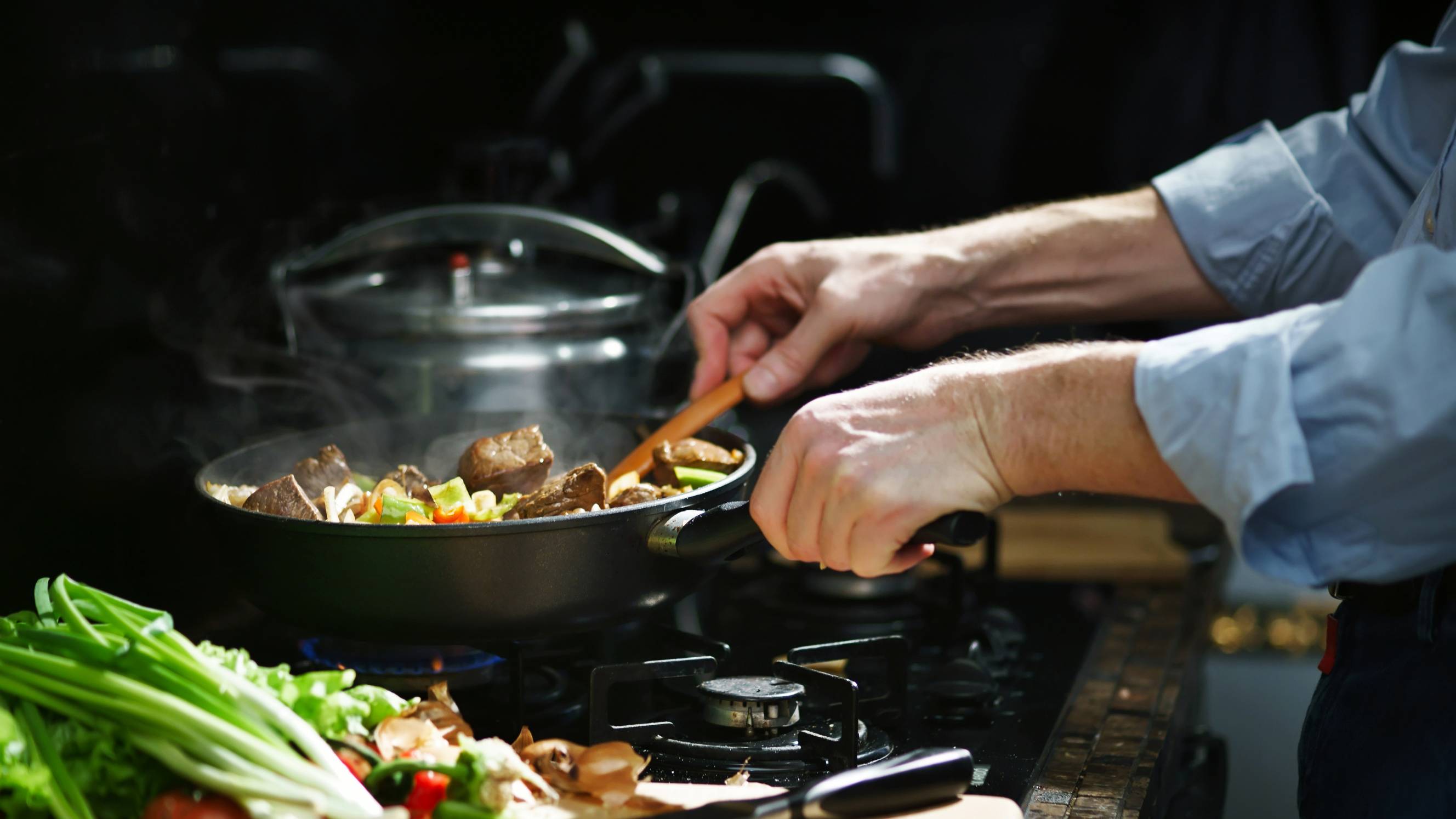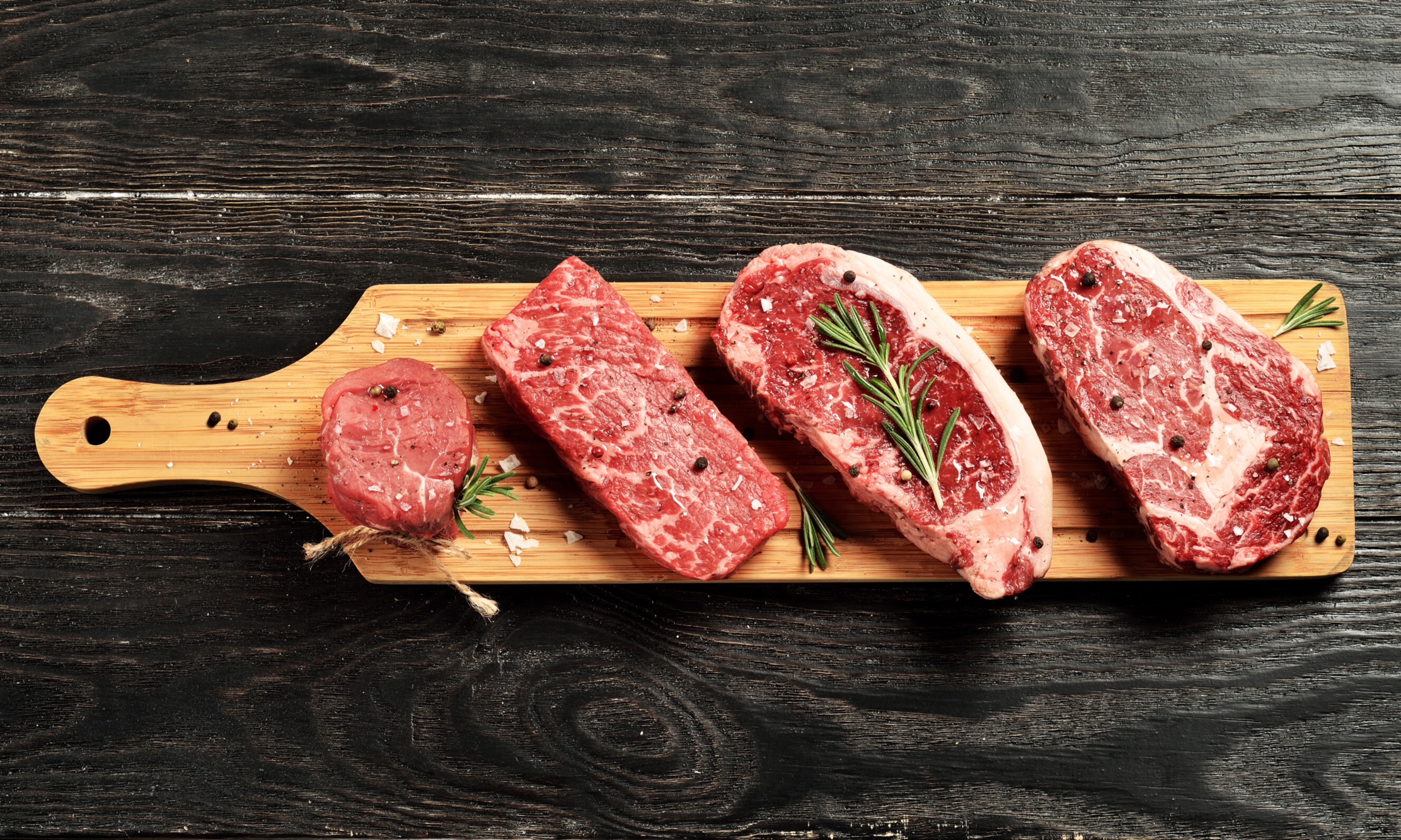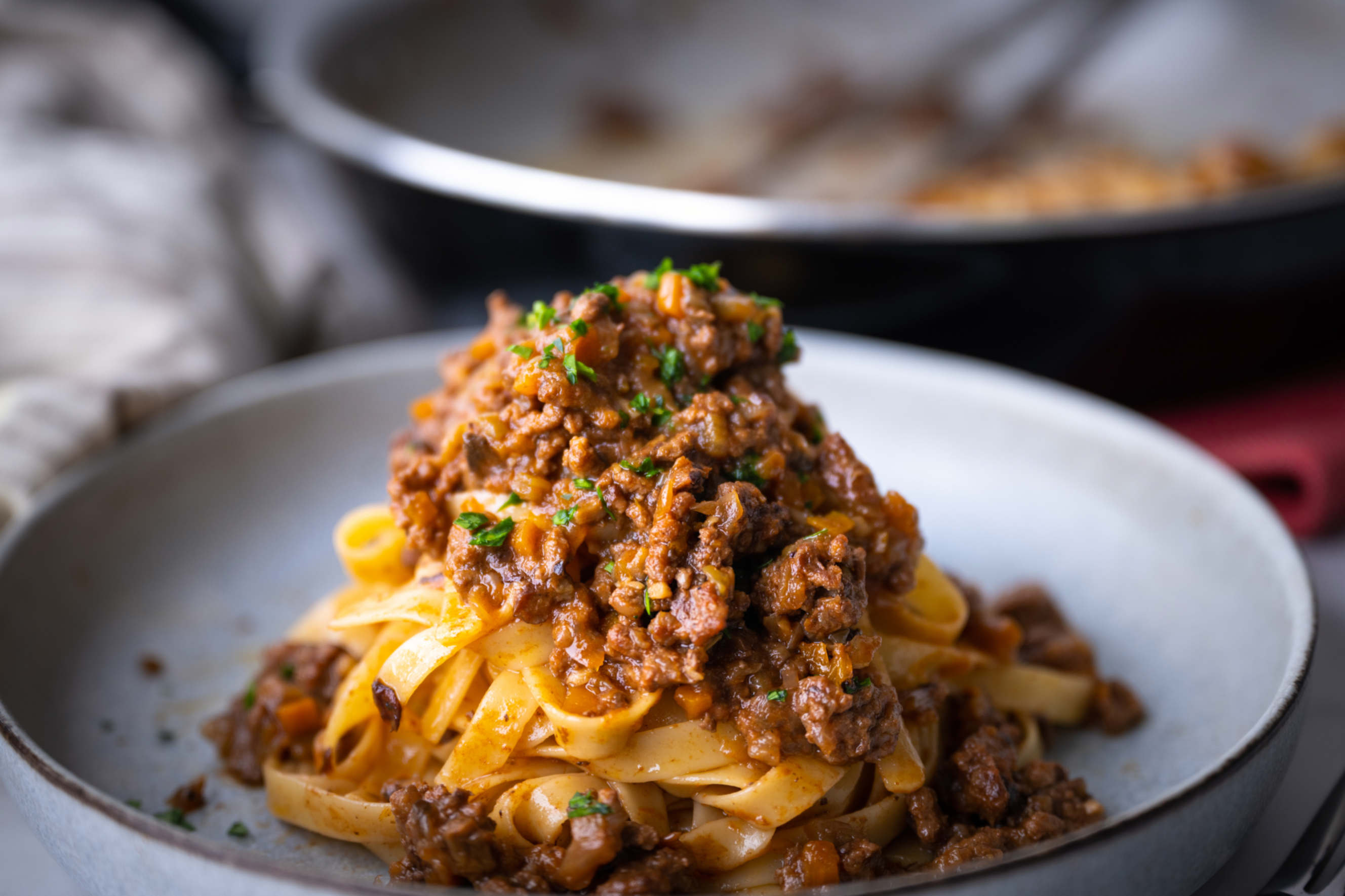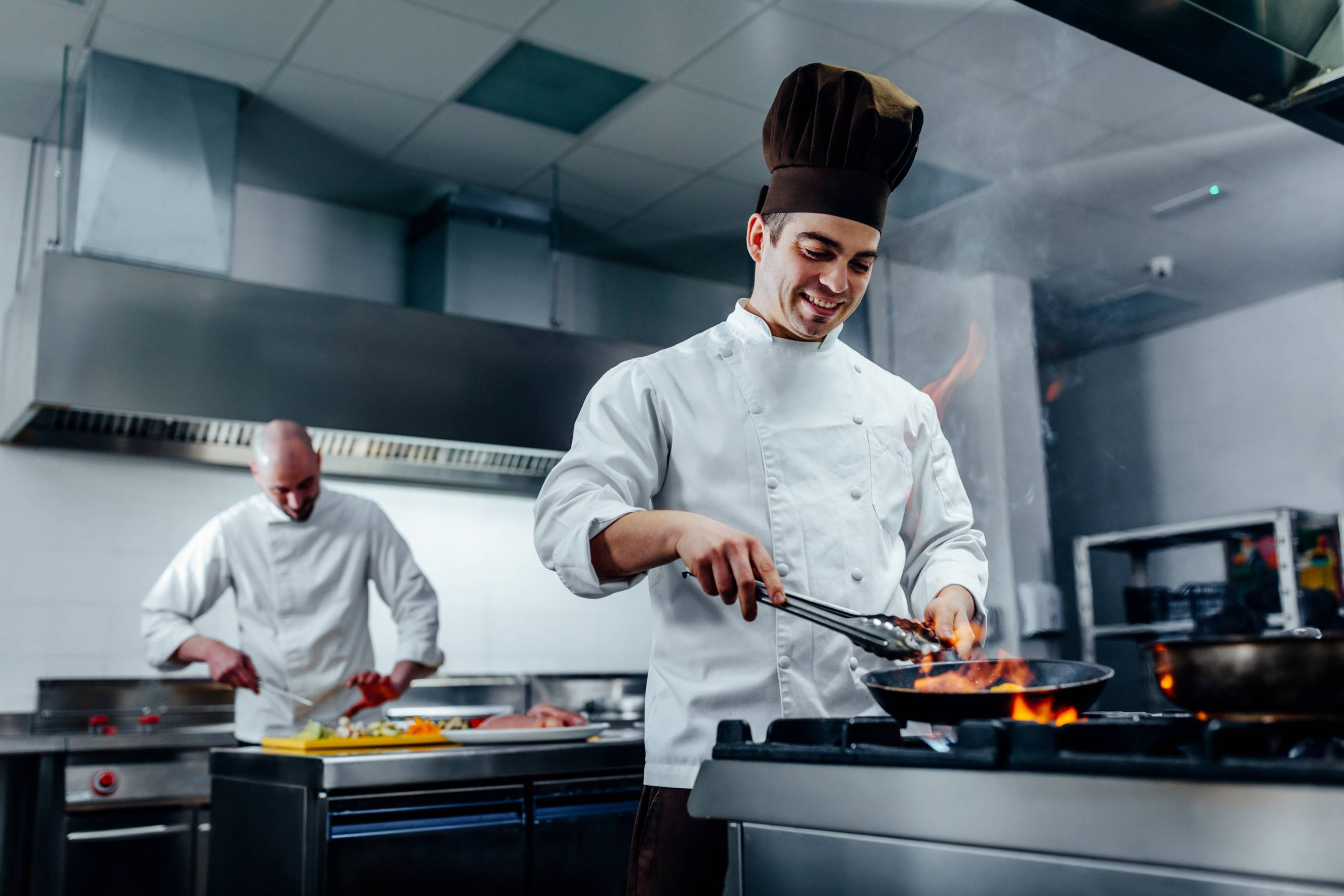
- Home/
- Comparisons/
- Chef/
- Chef vs Cook
Chef vs cook: How can you tell the difference?
Know who to call when you need food prepared when you're hosting at home.
Last Updated on

Written by Ma. Donna Dane B.
Contributor
Read more about our contributor
Key Facts
- A chef is a formally trained culinary professional who plans menus and manages the kitchen beyond cooking and developing innovative recipes.
- A cook focuses on preparing meals based on their practical experience in the industry, even without much formal culinary education.
If you’re running out of time and ideas for your personal meal prep or menu planning for an event you’re about to host, it’s time to think about hiring a chef vs cook. They can help you think about what food you can eat or serve, and of course, prepare and cook it for you.
This way, you can do other tasks to run your household or plan your party while the food is well taken care of. Read this guide to know the difference between a cook vs chef, whether it's their formal training, range of tasks, soft skills, and more. With this information, you’ll be sure to make the best decision for your needs.
What is a chef?
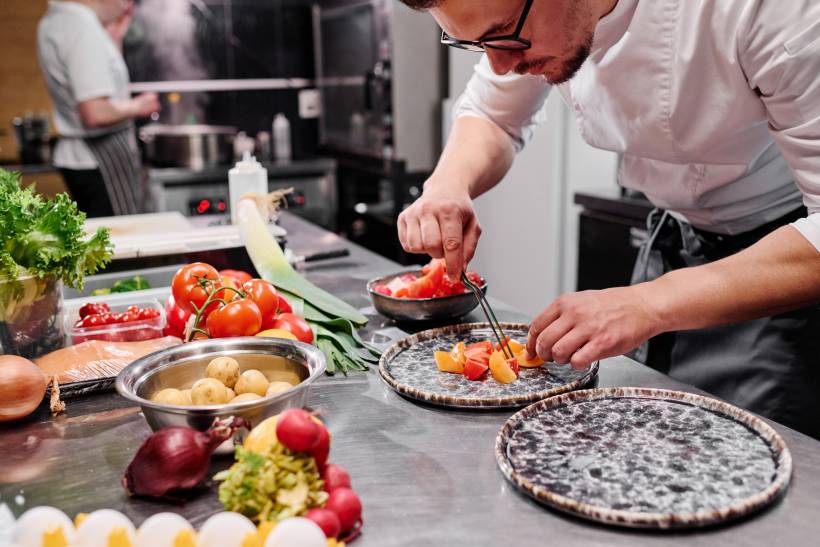 A chef in action. (Source: iStock)
A chef in action. (Source: iStock)
The word "chef" comes from the French term chef de cuisine, meaning "head of the kitchen." This gives you a good idea of their role in the culinary world. Chefs often work in high-pressure environments like restaurants, hotels, or plated vs buffet catering companies. They’re responsible for cooking, creating menus, managing kitchen staff, and ensuring that every dish meets a high standard.
Chefs are known for their creative and precise cooking style, as they create dishes that blend flavours, textures, and presentation into an unforgettable experience. Their training usually includes mastering various cooking techniques, understanding ingredients at a deep level, and learning how to pair food with beverages.
On the cultural level, the best chefs are also expected to know how to navigate sustainability and nutrition issues, which may influence the values of the people they serve.
What is a cook?
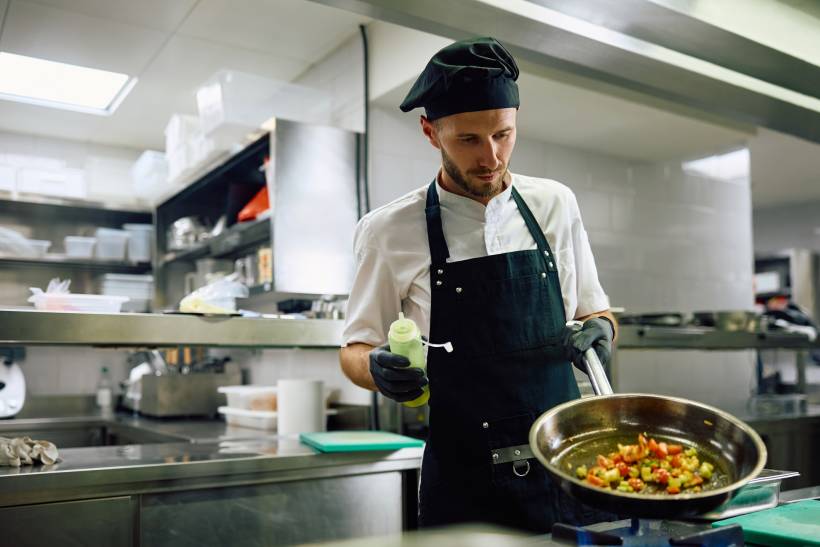 A cook preparing ingredients. (Source: iStock)
A cook preparing ingredients. (Source: iStock)
A cook is a skilled individual who prepares meals while considering practicality, comfort, and flavour. Unlike chefs, cooks don’t necessarily have formal training, though many have gained extensive hands-on experience working in kitchens, cafes, or private households throughout their culinary careers.
Cooks often prepare satisfying, wholesome meals that meet everyday needs or suit the preferences of the people they’re serving. They can prepare familiar dishes efficiently and consistently, while adapting recipes to cater to dietary requirements or personal tastes.
Compared to chefs, their role is more focused on execution rather than the creative aspects of menu development or kitchen management.
Cook vs chef: Which one do you really need?
Both chefs and cooks can make delicious food for you, but this section clarifies to what extent they can do this. The difference between a cook and a chef is emphasised by their experience, qualifications, creativity levels, and more.
In terms of qualifications
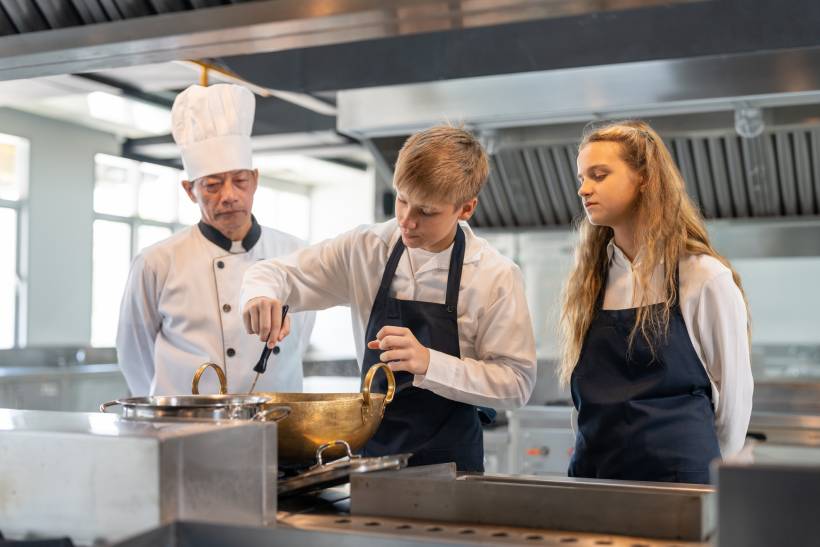 Chef teaching aspiring chefs. (Source: iStock)
Chef teaching aspiring chefs. (Source: iStock)
The primary difference between executive chefs and cooks lies in their level of formal training. Chefs typically have professional qualifications, such as a diploma or certificate from a culinary school.
There, they can learn everything from basic knife skills to advanced cooking techniques and even kitchen and restaurant management. This formal education is often complemented by years of apprenticeships and hands-on experience in professional kitchens, which is relatively similar to the requirements for a baker vs a pastry chef.
Cooks, on the other hand, rely more on practical experience rather than a culinary degree. Many have honed their skills from home cooking or on the job, learning through repetition and real-world practice. While they may not have the same theoretical knowledge as a chef, their hands-on approach often makes them highly valuable in the kitchen because of their efficiency and adaptability.
In terms of experience
A chef’s journey can start with entry-level roles like commis or novice chef before moving on to more senior roles such as sous chef or executive chef. This path allows them to develop expertise in both creative and technical aspects of cooking by working in restaurants, hotels, and other fast-paced kitchen environments.
Becoming a personal chef is also growing in popularity as a way for young chefs to build their skills and experience in the culinary industry.
Meanwhile, cooks often work in less formal settings, such as home kitchens, cafes, or smaller establishments. Constantly preparing reliable, everyday meals allows them to master the recipes and offer dishes with consistently good quality while considering the dietary needs and preferences of their clients.
In terms of responsibilities
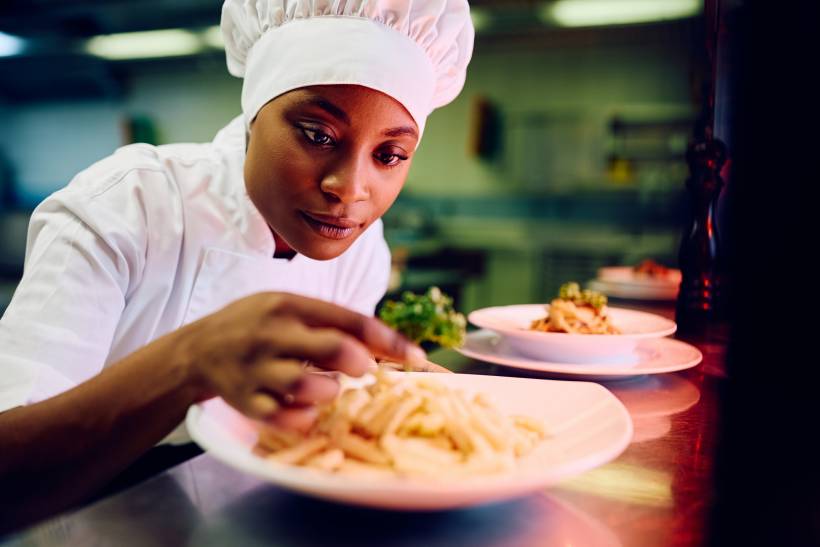 Chef plating food. (Source: iStock)
Chef plating food. (Source: iStock)
Beyond a chef’s cooking, they also carry a wide range of responsibilities. They’re often tasked with menu planning, sourcing ingredients, managing kitchen staff, and ensuring each dish meets quality standards. In professional kitchens, chefs create recipes for seasonal or specialty menu items. For private events, they customise dishes to suit specific themes and dietary needs, and plate each course in an artistic way.
Cooks have a more limited scope of responsibilities that focus on meal preparation. A cook is usually the one who’s expected to support kitchen operations instead of leading them. While they may handle some planning and ingredient preparation, they’re more concerned about the food itself rather than overseeing the whole dining experience. Some cooks also prefer to use their own kitchen and offer food delivery for their clients.
In terms of cooking creativity
With a strong foundation in culinary techniques and flavours, various types of chefs have the freedom to experiment with unique ingredient pairings, beautiful presentations, and the latest cooking styles.
As they develop recipes, craft seasonal or themed menus, and put their own special twist on classic dishes, they’re celebrated for their creativity. This quality truly shines as they cater fine dining experiences or special events where diners expect memorable and visually impressive meals.
In contrast, cooks are all about tried-and-true recipes and familiar flavours. While they may add their own flair to dishes, they prioritise preparing meals that are already well-loved by their diners instead of going for avant-garde takes on food.
In terms of adaptability to customer preferences
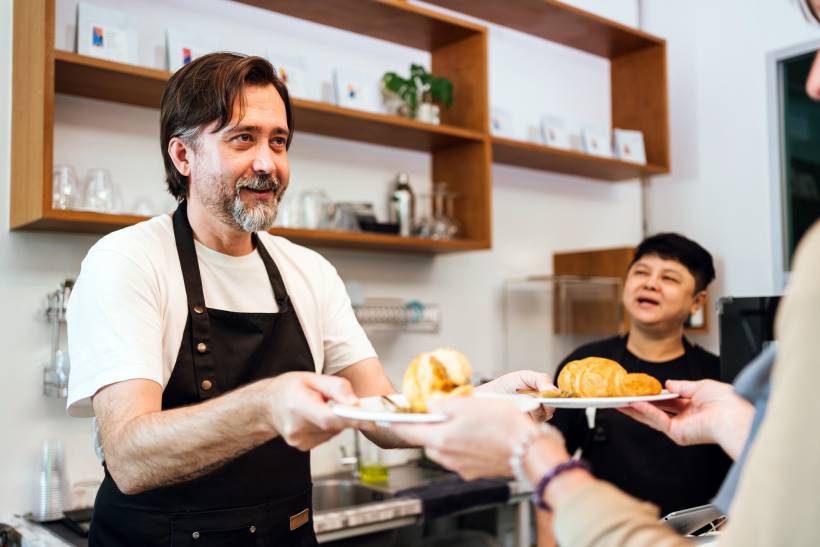 Home chef serving guests. (Source: iStock)
Home chef serving guests. (Source: iStock)
Chefs are trained to have a keen eye for detail, which helps them accommodate very specific customer preferences and dietary requirements. They can adapt recipes to create high-quality dishes, whether it’s for anyone who has various food allergies, for a client who loves vegan gourmet dishes, or for an event with a distinct cultural theme. If you want to hire a chef to cook at home, they can adjust their cooking to deliver a personalised dining experience for you and your guests.
Cooks are also skilled at tweaking recipes, adjusting portion sizes, or selecting ingredients to suit individual tastes. However, their execution is more practical than creative. Their adaptability tends to focus on simpler adjustments to meet customer preferences for consistent, straightforward meal preparation.
In terms of service cost
The average cost of hiring a cook or a chef here in Australia depends on the level of culinary expertise and the type of service provided. For cooks or home chefs catering smaller gatherings or offering meal prep services, prices typically range from $30 to $100 per hour for basic packages. This can go higher depending on the complexity of the menu and event size.
For private chefs offering premium services such as multi-course gourmet meals or Michelin-calibre dining, costs start around $200 and can climb to upwards of $500 per guest for elaborate, high-end experiences.
Hire a skilled chef or cook for any occasion on Airtasker
Chefs and cooks have their own strengths. While chefs have more technical expertise and kitchen management skills, cooks have years of experience preparing similarly comforting dishes to achieve comparable levels of mastery. Who to hire ultimately depends on your specific needs and preferences.
With Airtasker, you can post a task with your budget and soon get offers from culinary professionals who can fulfil your goals. You’d be able to view the profiles of local cooks and chefs who can do meal prep, event catering, and even barbecue cookouts for you. Hire a Tasker now to lessen your worries about food preparation.
Learn more about our contributors

Written by Ma. Donna Dane B.
Contributor
Donna is an experienced writer and editor with expertise in web content, help guides, documentation, and academic research. She's written professionally for companies and nonprofit organizations in the elearning, agriculture, food, and beauty. Outside of work, Donna explores small business baking, AI governance research, and long-distance running, which influence her writing.
Chef vs Cook
| Chef | Cook | |
|---|---|---|
Qualifications |
Received a certificate, diploma, or degree from a culinary school |
Relies more on practical experience than formal culinary training or education |
Experience |
Well-immersed in fast-paced kitchen environments, such as in hotels or restaurants |
Works in smaller establishments such as home kitchens or cafes |
Responsibilities |
Includes menu planning, ingredient sourcing, and kitchen management |
Focuses on the preparation and cooking of meals rather |
Cooking Creativity |
Experiments with ingredient pairings, unique presentations, and cooking techniques to innovate |
Sticks to reliable recipes that they already know their customers enjoy |
Adaptability to Customer Preferences |
Accommodates very specific customer preferences and dietary requirements |
Tweaks recipes and adjusts portion sizes to suit individual tastes |
Service Cost |
$200 to $500 per guest at a special event |
$30 to $100 per hour for meal prep or small gatherings |
FAQs on chefs and cooks
The terms "personal chef" and "private chef" are often used interchangeably, but there’s a difference in their quality of service and nature of employment. A personal chef typically prepares customised meals for an individual or family based on their preferences and dietary needs.
A private chef, on the other hand, is often employed full-time or part-time to work in a household or for specific events, usually catering to a high-end clientele. They are more likely to manage the kitchen and offer a more exclusive dining experience.
Yes, you can definitely hire someone for a barbecue cookout. They can manage everything from preparing the meat and side dishes to expertly grilling and serving the food, providing a great experience for you and your guests.
Yes, you can hire both cooks and chefs depending on your needs. Cooks are ideal for casual events or preparing everyday meals, while chefs are perfect for gourmet dining experiences or special occasions. Catering services or platforms like Airtasker allow you to find and hire both professionals, making it easy to match their expertise to your requirements.
Find chefs, fast
Post a task
Related price guides
Related articles
